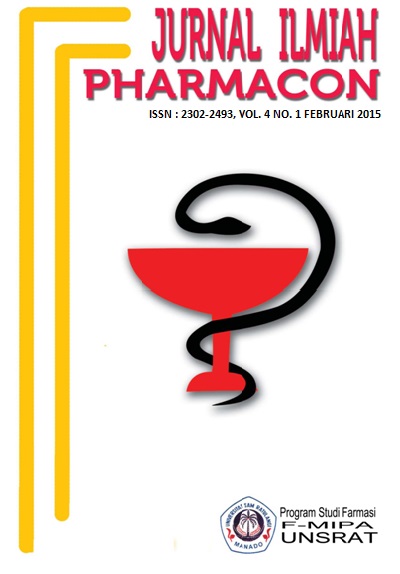Phytochemical screening and antipyretic effect of stem juice from kepok banana (Musa paradisiaca L) on white male rats stain wistar (Rattus norvegicus) induced with DTP-Hb
DOI:
https://doi.org/10.35799/pha.4.2015.6475Abstract
Phytochemical screening and antipyretic effect of stem juice from kepok banana (Musa paradisiaca L) on white male rats stain wistar (Rattus norvegicus) induced with DTP-Hb
Stanly Wasty Maya1), Gayatri Citraningtyas1), Widya Astuty Lolo1)
1)Program Studi Farmasi, FMIPA UNSRAT, MANADO
ABSTRACT
Banana (Musa paradisiaca) is a medicinal plant can which be used to cure various diseases, one type of banana plants, namely kepok banana (Musa paradisiaca L) Stem juice from kepok banana (Musa  paradisiaca L) used the empirically to treat fever.  This research aims to findout phytochemical content antipyretic effect of stem juice from kepok banana (Musa paradisiaca L) on white male rats stain wistar (Rattus norvegicus L) induced with DTP-Hb. Phytochemical testing conducetd according to harbone methods and antipyretic effect conducted using a completely randomized design. Test ed animals were divided into 5 groups : negative group , positive group (paracetamol), and treatment group of stem juice from kepok banana 0,37mL/200gBB, 0,75ml/200gBB, and 1,5 mL/200gBB. White male rats strain wistar phyrexia with vaccine DTP-Hb doses 0,08 ml/100 gBB by intaramuscular route. Rats’is rectal temperature was measured every 1 hour until 4 hours after the oral administration. Obtained data were analyzed by ANOVA and LSD (least significant different). The result showed that stem juice from kepok banana (Musa paradisiaca L) phytochemical compounds containing tanin, alkaloid, saponin and to testing the effects of antipyretic showed a decrease in temperature of 1-4 hours at a doses 0,37ml/200gbb decreased temperature of 37,1-35,0, the doses 0,75mL/200gBB decrease the temperature of 36,5-34,8 whereas the doses 1,5 mL/200gBBDecreaing the temperature of 35,0-34,1
Â
Keywords: stem juice kepok banana, Antipyretics, DTP-Hb, Rats
Â
ABSTRAK
Pisang (Musa paradisiaca) merupakan tanaman berkhasiat obat yang dapat digunakan untuk menyembuhkan berbagai macam penyakit, salah satu jenis tanaman pisang yaitu pisang kepok (Musa paradisiaca L), air batang pisang kepok digunakan secara empiris untuk mengobati demam. Penelitian ini bertujuan untuk mengidentifikasi senyawa fitokimia dan menguji efek antipiretik air batang pisang kepok (Musa paradisiaca L) terhadap tikus putih jantan galur wistar yang diinduksi vaksin DTP-Hb. Pengujian fitokimia dilakukan dengan metode Harbone dan pengujian efek antipiretik dilakukan menggunakan rancang acak lengkap. Hewan uji dibagi menjadi 5 kelompok yaitu kelompok negatif (tanpa perlakuan), kelompok kontrol positif (parasetamol) dan kelompok uji yaitu pemberian air batang pisang kepok 0,37mL/200gBB, 0,75ml/200gBB, dan 1,5 mL/200gBB. Pengukuran suhu dilakukan sebelum pemberian vaksin DTP-Hb, Tikus putih jantan diinduksi demam dengan vaksin DTP-Hb dosis 0,08 mL/100gBB tikus secara intaramuscular. Suhu rektal diukur tiap jam selama 4 jam setelah pemberian per oral. Data yang diperoleh dianalisis dengan menggunakan uji ANOVA dan uji LSD (least significant different). Hasil penelitian menunjukan bahwa air batang pisang kepok (Musa paradisiaca L) mengandung senyawa fitokimia Tanin, alkaloid, saponin, dan untuk pengujian efek antipiretik menunjukan adanya penurunan suhu dari jam 1-4 pada dosis 0,37 mL/200gBB mengalami penurunan suhu dari 37,1-35,0, pada dosis 0,75mL/200gBB penurunan suhu dari 36,5-34,8 sedangkan pada dosis 1,5 mL/200gBB mengalami penurunan suhu dari 35,0-34,1
Kata kunci : air batang pisang kepok, Antipiretik, DTP-Hb, Tikus
Downloads
Published
How to Cite
Issue
Section
License
Authors who publish with this journal agree to the following terms:
- Authors retain copyright and grant the journal right of first publication with the work simultaneously licensed under a Creative Commons Attribution-NonCommercial 4.0 International License that allows others to share the work with an acknowledgement of the work's authorship and initial publication in this journal.
- Authors are permitted and encouraged to post their work online (e.g., in institutional repositories or on their website) prior to and during the submission process, as it can lead to productive exchanges, as well as earlier and greater citation of published work (See The Effect of Open Access)










